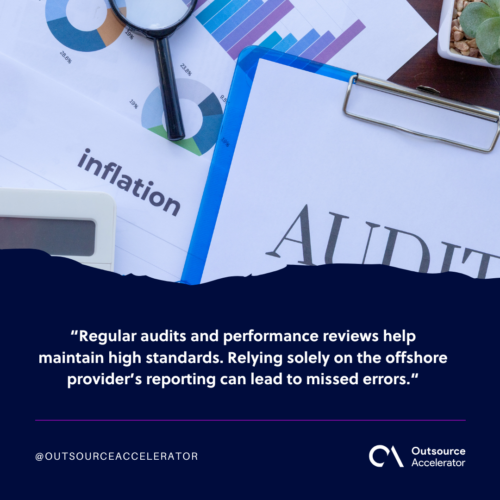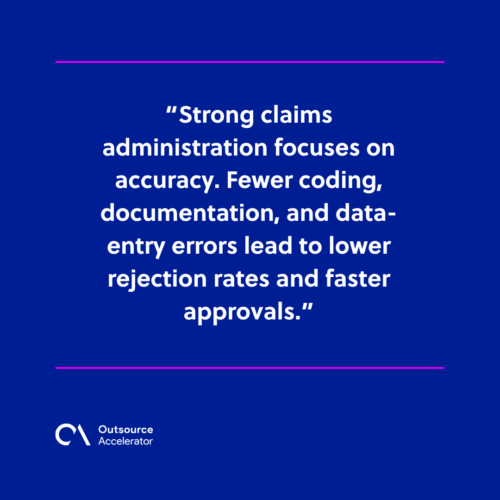8 dos and don’ts of offshoring medical claims administration

Medical claims administration involves processing, reviewing, and managing health insurance claims to support accurate billing and timely reimbursements. It’s a critical function that directly impacts both patient satisfaction and provider revenue.
As more industries embrace remote talent, healthcare organizations are also increasingly offshoring primary administrative tasks to boost efficiency and reduce costs.
Offshoring medical claims administration allows providers to access skilled professionals while focusing internal resources on patient care. However, success depends on following the right practices and avoiding common mistakes that can lead to delays or compliance issues.
This article explores eight important dos and don’ts of offshoring medical claims administration, helping healthcare leaders make strategic decisions when building or expanding their remote teams.
What makes an effective medical claims administration?
A well-managed medical claims process supports accurate billing, reduces revenue loss, and improves provider satisfaction.
Outlined below are the essential factors that define an effective medical claims administration:
Timely and accurate reimbursement
An effective system processes claims quickly and correctly. Prompt reimbursement helps healthcare providers maintain healthy cash flow and reduces delays that can affect operations.
Reduced claim denials
Strong claims administration focuses on accuracy. Fewer coding, documentation, and data-entry errors lead to lower rejection rates and faster approvals.
Revenue maximization
Beyond processing claims, an efficient workflow identifies opportunities to capture all billable services. This approach supports higher reimbursements and improves the organization’s financial performance.
Regulatory compliance
Effective claims teams stay up to date with HIPAA and other industry regulations. Following these guidelines protects sensitive patient data and reduces the risk of penalties or legal issues.
Improved efficiency
A streamlined process powered by automation and data analysis speeds up workflows and reduces manual tasks. It allows teams to focus on more strategic, high-value activities.
When these elements come together, medical claims administration becomes a strategic advantage. Healthcare providers are able to improve accuracy, reduce overhead, and strengthen their bottom line.
8 Dos and don’ts of offshoring medical claims administration
As patient volumes rise and billing processes become more complex, offshoring can relieve pressure and boost operational efficiency.
However, success depends on working with the right partner and approach. Making sensible decisions and avoiding common missteps helps protect revenue, data, and service quality.
Here are eight key dos and don’ts to guide healthcare providers through the offshoring process:
Dos of offshoring medical claims administration
1. Do choose a provider with healthcare experience
Work with an offshore partner that understands the healthcare industry, medical terminology, and claims processes. This reduces training time and improves accuracy.
2. Do prioritize data security
Make data protection a top priority. A good offshore team should follow strict protocols that align with HIPAA and other relevant regulations.
3. Do invest in proper onboarding
Set clear expectations from the start. Provide detailed documentation, training, and access to tools that help offshore staff integrate smoothly with your internal team.
4. Do maintain open communication
Use collaboration tools to stay in touch regularly. Frequent updates help spot potential issues early and support a productive working relationship.
Don’ts of offshoring medical claims administration
5. Don’t focus only on cost
While offshoring is cost-effective, choosing the cheapest option may lead to poor quality. Balance affordability with experience and service quality.
6. Don’t skip quality control
Regular audits and performance reviews help maintain high standards. Relying solely on the offshore provider’s reporting can lead to missed errors.

7. Don’t ignore cultural differences
Take time to understand how communication styles, work habits, and time zones may differ. A little awareness can improve team dynamics.
8. Don’t expect instant results
Offshoring takes time to reach full efficiency. Be patient as your offshore team gets familiar with your processes and expectations.
Get the most value from offshoring medical claims administration by considering the aforementioned dos and don’ts.
Hire seasoned medical claims specialists—only at Outsourced Global
Outsourced Global helps healthcare organizations find experienced medical claims specialists who can handle complex billing tasks with accuracy and speed. It has remote professionals who can integrate easily into existing teams, helping reduce denials and improve cash flow.
Partner with Outsourced Global to streamline your claims process and access the talent needed to support long-term growth. Start building your remote team today!








 Independent
Independent




